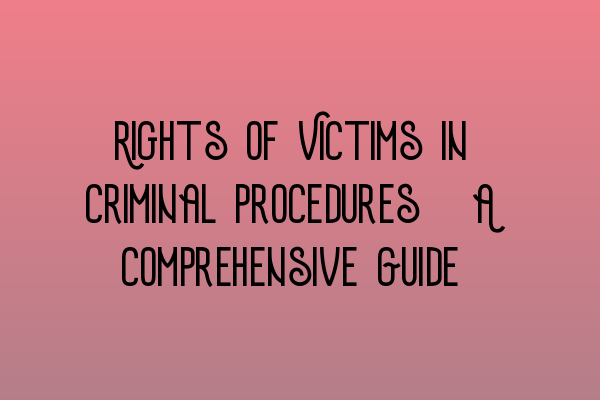Rights of Victims in Criminal Procedures: A Comprehensive Guide
Welcome to SQE Criminal Law & Practice Law UK! In this comprehensive guide, we will explore the rights of victims in criminal procedures. As a solicitor, it is essential to have a thorough understanding of these rights to ensure the proper representation and support of your clients.
The Importance of Victim’s Rights
In the criminal justice system, the focus is often on the accused and their rights. However, it is equally important to consider the rights of the victims. Victims play a crucial role in the prosecution of a criminal offense, and their rights need to be protected throughout the process.
For further preparation, you can find SQE 1 practice exam questions here and SQE 1 practice mocks FLK1 FLK2 here.
Types of Rights for Victims
Victims of crime have various rights that are designed to ensure their participation in the criminal justice process and provide them with support and assistance. Some of these rights include:
- The right to be informed – Victims have the right to be informed about the progress of their case, including updates on investigations, court proceedings, and relevant decisions.
- The right to be heard – Victims have the right to be heard during court proceedings, giving them an opportunity to express their views, concerns, and the impact of the crime on their lives.
- The right to protection – Victims have the right to protection from intimidation and harassment, both during and after the criminal proceedings.
- The right to compensation – In certain cases, victims may be entitled to compensation for physical, emotional, or financial harm suffered as a result of the crime.
To know more about SQE 2 preparation courses, click here.
Support for Victims
Recognizing the traumatic experience victims go through, the criminal justice system provides various support mechanisms to assist them. This includes:
- Victim Support Organizations – There are numerous organizations dedicated to providing support and guidance to victims of crime. These organizations offer services such as counseling, emotional support, and practical assistance.
- Victim Personal Statements – Victims have the opportunity to make a Victim Personal Statement (VPS) to express the impact of the crime on their lives. This statement is considered during sentencing and can influence the court’s decisions.
- Special Measures – Special measures can be put in place to protect vulnerable victims during court proceedings. This may include screening them from the accused, using video links, or providing extra support while giving evidence.
If you are preparing for SQE 1, you can find SQE 1 preparation courses here. Additionally, it’s important to stay updated with the SRA SQE exam dates. You can find them here.
Conclusion
Understanding and advocating for the rights of victims in criminal procedures is an essential aspect of being a solicitor. By ensuring that victims are informed, heard, and supported, you contribute to a fair and just criminal justice system.
For any further assistance or information, feel free to contact SQE Criminal Law & Practice Law UK. Together, we can make a difference!
